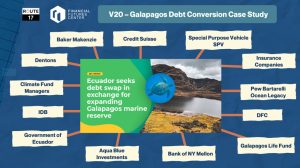Although Africa has contributed only 3.8 percent of total global emissions, it has borne the brunt of climate change. With a substantial lack of energy access in Sub-Saharan Africa, the continent must balance the need to combat climate change with an urgency to develop the continent’s economies to alleviate hunger and poverty, which are exacerbated by the impacts of climate shocks on agriculture.
A new technical paper from researchers at the African Economic Research Consortium and the African Center for Economic Transformation explores the effects of climate change on growth, debt and sectoral output in Africa. This paper is part of a series of new research from the Task Force on Climate, Development and the International Monetary Fund.
Key findings:
- A 1.8°C rise in temperature would lead to a 2-percentage point decline in real gross domestic product (GDP) growth in Africa per year.
- A 1 percent decline in real GDP growth could worsen the budget deficit by 0.3-percentage points from its trend, suggesting the impact of climate change could upend fiscal space significantly.
- As a result, the debt-burden in African countries could increase 2.4 times due to climate change induced shocks.
- Economic modeling suggests that carbon pricing could be an effective way to meet nationally determined contributions (NDCs). However, if not well-designed, carbon pricing mechanisms can have regressive effects, particularly on low-income households.
Policy recommendations:
- Climate change risk needs to be explicitly incorporated into the macroeconomic management, policies and tools of African governments.
- Debt sustainability frameworks need to be revisited to consider climate change risks, development potentials and mitigation policies so that debt is leveraged for purposes of productive investment and growth.
- Several countries including Burkina Faso, Côte d’Ivoire, Nigeria, Rwanda and Senegal have expressed an interest in advancing carbon pricing at a domestic level, and there has been some interest in carbon pricing at the regional level. While this could lead to the implementation of a regional carbon tax or emissions trading system, it would require significant regional collaboration and leadership. Building capacity and expertise would also be necessary to assess and implement carbon pricing mechanisms.
- Participation in international carbon markets and offsetting schemes requires a credible system for measuring, reporting and verifying emissions. However, many African countries have been unable to accurately measure and report the carbon sequestered in their forests. At the upcoming 27th United Nations Climate Change Conference (COP27), African stakeholders need to push for more capacity building and technical assistance.
- In the transition to low-carbon pathways, African resources will be vital. Although accounting for a small proportion of current global resources, Africa has a significant proportion of untapped mineral reserves: 30 percent of bauxite, 60 percent of manganese, 75 percent of phosphates, 85 percent of platinum, 30 percent of titanium and 60 percent of cobalt. In these efforts, it will be crucial to ensure that sustainable techniques are used and fair employment practices are enforced.




